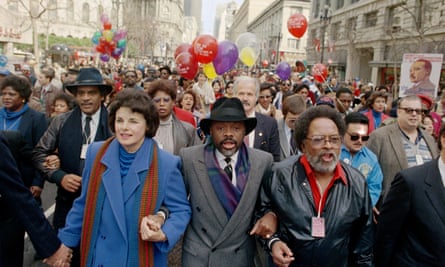The Rev Cecil Williams, the longtime head of a church that grew to international fame for being a safe haven for San Francisco’s most marginalized citizens, has died. He was 94 years old. He, alongside his wife and poet Janice Mirikitani, transformed Glide Memorial church into an institution built on love and support for the city’s queer community and those struggling with homelessness and drug addiction. Mirikitani died in 2021 at 80.
Williams died on Monday at his home in San Francisco surrounded by friends and family, Glide said in a statement. A cause of death was not given.
An advocate for civil rights and social justice, Williams drew the attention of celebrities, politicians and businessmen, including Warren Buffet, who for years helped Williams raise money for the church through an auction for a private lunch with the hedge fund manager.
Maya Angelou, Isabel Allende, Bono, Oprah Winfrey and Bill Clinton were among the celebrities who once attended services at Glide. Williams and Mirikitani appeared in Will Smith’s film The Pursuit of Happyness, which was based on the life of a homeless father and son who once found help at Glide. Williams’s focus always remained on helping the poor.
“I would have to be with people I understand, and it’s the poor,” Williams told the San Francisco Chronicle in a 2013 interview. “I’m with them wherever they are.”

The announcement of Williams’s death was met with a deluge of mournful social media posts from local and national officials including Nancy Pelosi, who described Williams as “a spiritual giant, whose saintly good works have transformed countless lives in the Bay Area and beyond”.
San Francisco’s mayor, London Breed, described Williams as a towering and aspirational figure of the Black community.
“Growing up, there were members of the African American community that inspired us to dream, and to serve, and Cecil Williams was at the top of that list,” Breed wrote on X. “Cecil mentored generations of San Francisco leaders, many of us emerging from the most difficult circumstances … We would not be who we are as a city and a people without the legendary Cecil Williams.”
Born and raised in the segregated west Texas town of San Angelo, Williams moved to San Francisco in 1963 to become the pastor at what was then called Glide Memorial United Methodist church, a house of worship with a dwindling number of parishioners in the heart of the city’s largely impoverished Tenderloin district.
Williams and Mirikitani transformed the church with Sunday services that included a jazz band and a gospel choir. The church eventually amassed 10,000 members, becoming the largest Methodist church in northern California and one of the largest in the nation.
They also put the church’s sermons into action and through the Glide Foundation started several community outreach programs that have served thousands of San Franciscans for more than six decades.
“He led re-entry programs for those leaving prison, provided clothing and housing for people in need, and helped thousands of people access healthcare,” Kamala Harris, the US vice-president, said in a statement, adding that Williams was “a dear friend” and ”a beacon of light and love”.
Williams never shied from political and social issues, ranging from gay rights to homelessness to drug addiction.
He retired as the church’s pastor in 2000 but remained the minister of liberation and CEO of the Glide Foundation until last year, when he stepped down.
“The essence of Glide begins and ends with love … It is time for me to evolve, it is time for Glide to continue to evolve. We have gone through so much and come out strong, ready to keep building,” Williams wrote in a letter to parishioners.
Associated Press contributed to this report
